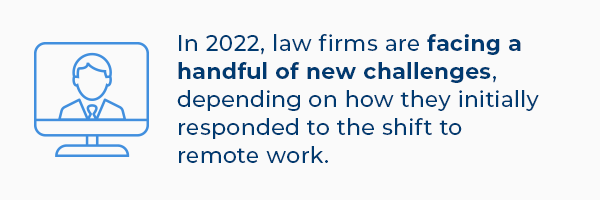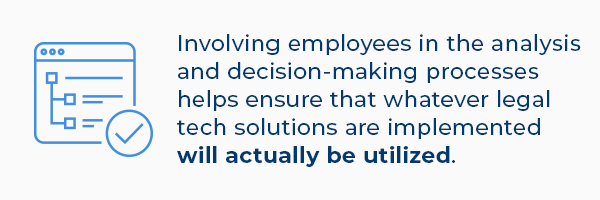As with most professional service providers, legal professionals have a tendency to fall into the “If it ain’t broke…” camp. It’s a big part of the reason why many law firms have historically been slow to adopt new technology.
But over the past two years, attorneys have been put in a position where choosing not to implement new legal tech isn’t really an option anymore.
In this article, we’ll explore how the COVID-19 pandemic has affected law firm technology decisions, share essential steps to take and questions to ask when evaluating technology for attorneys, and discuss what all the best legal tech solutions have in common.
The Impact of COVID-19 on Legal Tech
After a worldwide pandemic forced nearly every aspect of the legal industry to remote environments, law firms found themselves in varying levels of preparedness to make the transition.
According to Aderant’s 2020 Business of Law and Legal Technology Survey, only about one in four law firms were “completely prepared" for full-scale remote work at the onset of the pandemic. The rest were put in a position of having to identify and resolve technology gaps as quickly as possible.

For some practices, the strategy involved investing in several different legal tech solutions, even if they didn’t necessarily need all of them, in case the software would prove useful in the future. Other legal professionals found ways to make do with the technology they had as they were operating under the assumption that working remotely would be temporary.
Now, in 2022, law firms are facing a handful of new challenges, depending on how they initially responded to the shift to remote work.
Firms that adopted multiple new solutions are discovering redundancies and inefficiencies and realizing they need to reevaluate their systems. Practices that took more of a stopgap approach have accepted that this new paradigm isn’t going anywhere and it’s time to start making upgrades. Even firms that had a seamless transition to remote work now have the opportunity to streamline and optimize their technology by leveraging the past two years of data.
Whichever category your law firm falls into, it’s a good idea to conduct a thorough assessment of your processes to identify where new tech investments are needed and which of your existing solutions can be retired.
Note: There are plenty of business software solutions that are designed to be industry-agnostic—e.g., Microsoft Office, Google Workspace, etc. For the purposes of this article, we’re going to focus on legal-specific technology.
Selecting the Right Type of Law Office Technology
Technology is an integral part of every attorney’s day-to-day—from trial lawyers preparing for a case to transactional attorneys drafting and organizing documents. Accordingly, choosing which law office technology to use in your practice is a huge decision.
What makes the process particularly difficult is that there are so many variables to consider, starting with the sheer number of categories of law firm software. Here’s just a snapshot of some of the different types of legal tech you can choose from:
Accounting
Appointment Booking
Billing / Accounts Receivable (AR)
Calendaring / Docketing
Case Management
Client Portals
Client Intake / Client Relationship Management (CRM)
Document and Records Management
Document Automation
e-Discovery
Legal Research
Practice Management
Time and Expense Tracking
Of course, not every law office needs every kind of software. Factors such as the business’ size, the area of law attorneys in the firm practice, and the number and types of clients they serve will all play a major role in trimming down that list initially.
Narrowing Down Your Legal Tech Software Options
Once you have a general idea of the type(s) of solution(s) you want to potentially implement, your next step is to answer a few questions about the practice itself as well as your objectives and expectations in regards to the technology:
What are your firm’s overall strategy, mission, and business objectives?
Where does the business stand today and where do you want it to be?
Has the practice undergone any recent changes that could affect your technology needs?
How does your current technology further the firm’s goals?
In what ways does your current technology fall short?
Finding the answers to these questions helps you determine which legal tech software makes the most sense for your firm. This exercise is crucial to understanding where technology fits into your operations and for setting realistic expectations about what you can achieve with technology.

For larger practices, one option is to create a committee composed of the individuals who will be using the law firm software—from admins to attorneys—to conduct the necessary research, gather the relevant information, and provide recommendations. Involving these employees in the analysis and decision-making processes helps ensure that whatever legal tech solutions are implemented will actually be utilized.
Plus, this cohort has the most insight into which of the current solutions have low adoption rates and why.
Prioritizing the Essentials
After you’ve identified which type(s) of software the practice needs, you need to establish which aspects of law firm technology are the most important to your business.
It goes without saying that data security and the ability to maintain confidentiality are non-negotiables. But beyond those, you’ll have to decide which features and functionalities are absolutely essential and which are simply nice-to-haves.
Below are examples of some attributes to think about when comparing solutions:
Can be up and running quickly
Has an intuitive, easy-to-navigate interface
Clearly demonstrates value to the firm
Is accessible both in-office and remotely
Costs less to maintain than to replace
Offers a native mobile app
Provided by a vendor who offers ongoing customer support
From there, you can take advantage of the myriad resources available to help you evaluate your options. According to the ABA TechReport 2021, 88 percent of firms turn to colleagues for their input when assessing legal tech. This is followed by reading expert reviews (79 percent), seeking out online customer reviews (75 percent), and using a consultant (71 percent).
15 Boxes Only the Best Legal Tech Solutions Can Check
For every category of law firm software listed above, there are anywhere from a handful to hundreds of options to choose from. When it comes to the basic purpose of the solution, you can expect each provider to offer a similar level of functionality. However, not all law office technology is created equal.
For example, if you’re comparing payment solutions, you should aim only to partner with a provider that can check off every item in the list below.
[html: <ul style="list-style:none;"> <li> 1. Has a legal-focused foundation and understands the distinct financial requirements of legal professionals like you. </li> <li> 2. Is vetted and recommended by your <a href="https://www.lawpay.com/member-programs/">state bar association and the ABA</a>. </li> <li> 3. Deducts processing fees only from your operating account and in one lump sum at the end of the month, instead of on every transaction. </li> <li> 4. Features <a href="https://www.lawpay.com/partners/integrated-partners/">direct integrations</a> with the other law firm software solutions you rely on to run your business. </li> <li> 5. Allows you to securely accept eCheck payments in addition to credit and debit cards online and in person. </li> <li> 6. Is trusted by tens of thousands of law firms across the U.S. and Canada. </li> <li> 7. Enables you to offer clients <a href="https://www.lawpay.com/about/blog/clientcredit-legal-client-financing/">legal fee financing</a> options so clients can pay over time but you get your full fee upfront. </li> <li> 8. Guarantees third-party debits will never be allowed from your trust account <i>under any circumstances</i>. </li> <li> 9. Provides access to <a href="https://www.lawpay.com/about/blog/commitment-to-customer-support/">customer support</a> from an in-house team of payments experts via phone, email, and chat. </li> <li> 10. Allows you to accept advance payments for future work as well as separate earned and unearned fees. </li> <li> 11. Includes <a href="https://www.lawpay.com/features/scheduled-payments/">scheduled/recurring payment tools</a> at no additional cost. </li> <li> 12. Uses Level 1 PCI DSS certified technology and offers a no-charge PCI compliance program for your business. </li> <li> 13. Offers proactive, comprehensive chargeback assistance. </li> <li> 14. Provides valuable resources such as ebooks, guides, and sample forms along with no-charge CLE webinars. </li> <li> 15. Requires no set-up or cancellation fees or long-term contracts. </li> </ul>]
Knowing how to determine whether a potential legal tech solution is worth adopting (or if a solution already in use is fulfilling its purpose) can be the difference between investing in technology that drives the firm forward and losing money on software that causes more problems than it solves.
Don’t waste resources on implementing technology that isn’t right for you or your business. When you understand your firm’s unique needs and take the time to weigh all of your options, you can choose the right solutions to support your practice now and into the future.
About the author

Callie Hinman
